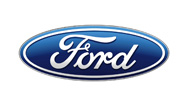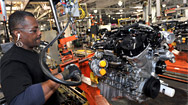Charcoal and Pig Iron Production in Brazil: An Example of Our Efforts to Address Human Rights Abuses in Our Supply Chain
Ford’s efforts to address human rights abuses in the production of charcoal and pig iron in Brazil illustrate our proactive approach to addressing human rights issues deep in our raw materials supply chain. In 2006, Ford discovered that charcoal produced in Brazil with the use of slave labor had found its way into our supply chain. Pig iron is a key ingredient in steel production, and in Brazil, charcoal is often used as fuel in the production of pig iron (see the Pig Iron Producers graphic below). The charcoal is made from wood harvested in remote areas of Brazil where instances of forced labor have been found to occur. At the time this issue was brought to our attention in 2006, pig iron was purchased directly by Ford and used at our Cleveland Casting Plant.
When we learned of the situation, we immediately stopped sourcing from the site that was identified in the investigation, but we continued dialogue with the supplier and helped them to develop management systems until such time as the supplier could ensure it was not supporting forced labor in the supply chain for pig iron. We then identified all potential points of entry for pig iron in the Ford value chain and engaged with all relevant suppliers, seeking assurances from them that forced labor was not employed anywhere in their value chain. This included an intensive mapping of five to six tiers of suppliers (including importers, exporters and trading companies). We also requested additional detail regarding our Tier 1 suppliers’ systems for safeguarding human rights throughout their operations, including procurement.
The Cleveland Casting Plant was closed in 2010, and Ford no longer directly purchases pig iron. Regardless, we have continued, through integrated supplier development programs, to convey our prohibition of forced labor and to validate, where possible, supplier compliance. Validation continues to be challenging given the number of supply chain actors between Ford and the charcoal camps in Brazil. For this reason, in 2011 we renewed our inquiry into the potential points of entry for Brazilian pig iron to our supply chain and are evaluating specific supplier progress on management systems to ensure responsible procurement of this material. We also are working with the U.S. State Department, the International Labour Organization and the governing committee of the Brazilian National Pact to Eradicate Forced Labor to seek multilateral solutions that will help to validate information and improve transparency. Ultimately, we hope to enable responsible purchasing decisions throughout the supply chain.
Pig Iron Producers











